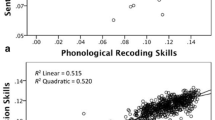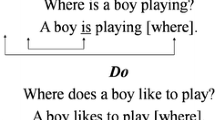Abstract
Shankweiler and colleagues argue that text comprehensionproblems in young children arise from phonological processingdifficulties. Their work has focused on children with poor wordreading ability. We investigated this hypothesis for children whoexperience comprehension difficulties in the presence of age-appropriate word reading skills. We found that good and poorcomprehenders performed comparably on various measures ofphonological processing and differed on a task that made greaterdemands on working memory, Bradley and Bryant's odd-word-outtask. In a final study, hierarchical regression analyses supportedthis distinction: the odd-word-out task was a strong predictor ofreading comprehension performance even after IQ, vocabulary and single word reading had been controlled for, but a lessmemory-dependent phonological task was not. These studiessupport previous work which indicates that poor comprehenders'problems arise from higher-level processing difficulties.
Similar content being viewed by others
References
Baddeley, A. (1986). Working memory. New York: Oxford University Press.
Bradley, L. & Bryant, P. E. (1978). Difficulties in auditory organisation as a possible cause of reading backwardness, Nature 271: 746–747.
Brady, S. A. & Shankweiler, D. P. (eds.) (1991). Phonological processes in literacy: A tribute to Isabelle Y. Liberman. Hillsdale, NJ: Erlbaum.
Cain, K. & Oakhill, J. (1996). The nature of the relationship between comprehension skill and the ability to tell a story, British Journal of Developmental Psychology 14: 187–201.
Dunn, L. M., Dunn, L. M., Whetton, C. & Pintillie, D. (1982). British picture vocabulary scale. Windsor: NFER-Nelson.
Ellis, N. & Large, B. (1988). The early stages of reading: A longitudinal study. Special issue: Cognitive psychology and the unskilled reader, Applied Cognitive Psychology 2: 47–76.
Gates, A. I. & MacGinitie, W. H. (1965). Gates-MacGinitie reading tests. NewYork: Columbia University Teachers' College Press.
Gombert, J. E. (1992). Metalinguistic development [translation of: Le developpement Meta-linguistique]. New York: Harvester Wheatsheaf.
Goswami, U. & Bryant, P. (1990). Phonological skills and learning to read. Hove, UK: Erlbaum.
Gottardo, A., Stanovich, K. E. & Siegel, L. S. (1996). The relationships between phonological sensitivity, syntactic processing, and verbal working memory in the reading performance of third-grade children, Journal of Experimental Psychology 63: 563–582.
Hall, J. W., Wilson, K. P., Humphreys, M. S., Tinzmann, M. B. & Bowyer, P. M. (1983). Phonemic-similarity effects in good vs. poor readers, Memory and Cognition 11: 520–527.
Hatcher, P. J., Hulme, C. & Ellis, A. W. (1994). Ameliorating early reading failure by integrat-ing the teaching of reading and phonological skills: The phonological linkage hypothesis, Child Development 65: 41–57.
Holligan, C. & Johnston, R. S. (1988). The use of phonological information by good and poor readers in memory and reading tasks, Memory and Cognition 16: 522–532.
Johnston, R. S. (1982). Phonological coding in dyslexic readers, British Journal of Psychology 73: 455–460.
Johnston, R. S., Rugg, M. D. & Scott, T. (1987). Phonological similarity effects, memory span and developmental reading disorders. The nature of the relation, British Journal of Psychology 78: 205–211.
Leather, C. V. & Henry, L. A. (1994). Working memory span and phonological awareness tasks as predictors of early reading ability, Journal of Experimental Child Psychology 58: 88–111.
Liberman, I. Y. & Shankweiler, D. (1991). Phonology and beginning reading: A tutorial. In: L. Rieben and C. A. Perfetti (eds.), Learning to read: Basic research and its implications (pp. 3–17). Hillsdale, NJ: Erlbaum.
MacGinitie, W. H. & MacGinitie, R. K. (1989). Gates-MacGinitie reading tests. Chicago: Riverside Publishing Company.
Mann, V. A., Liberman, I. Y. & Shankweiler, D. (1980). Children's memory for sentences and word strings in relation to reading ability, Memory and Cognition 8: 329–335.
Mann, V. A., Shankweiler, D. & Smith, S. T. (1984). The association between comprehension of spoken sentences and early reading ability: The role of phonetic representation, Journal of Child Language 11: 627–643.
McDougall, S., Hulme, C., Ellis, A. & Monk, A. (1994). Learning to read: The role of short-term memory and phonological skills, Journal of Experimental Child Psychology 58: 112–133.
Neale, M. D. (1989). The Neale analysis of reading ability, revised British edition. Windsor: NFER-Nelson.
Oakhill, J. V. (1982). Constructive processes in skilled and less-skilled comprehenders' memory for sentences, British Journal of Psychology 73: 13–20.
Oakhill, J. & Garnham. A. (1988). Becoming a skilled reader. Oxford: Basil Blackwell.
Perfetti, C. A. (1985). Reading ability. Oxford: Oxford University Press.
Perfetti, C. A. (1991). Representations and awareness in the acquisition of reading compet-ence. In: L. Rieben & C. A. Perfetti (eds.), Learning to read: Basic research and its implications (pp. 33–44). Hillsdale, NJ: Erlbaum.
Perfetti, C. A., Beck, I., Bell L. C. & Hughes, C. (1987). Phonemic awareness and learning to read are reciprocal: A longitudinal study of first grade children, Merrill-Palmer Quarterly 33: 283–319.
Shankweiler, D. (1989). How problems of comprehension are related to difficulties in word reading. In: D. Shankweiler & I. Y. Liberman (eds.), Phonology and reading disability: Solving the reading puzzle (pp. 35–68). Ann Arbor, MI: University of Michigan Press.
Shankweiler, D., Liberman, I. Y., Mark, L. M., Fowler, C. A. & Fischer, F. W. (1979). The speech code and learning to read, Journal of Experimental Psychology: Human Learning and Memory 5: 521–545.
Smith, S. T., Macaruso, P., Shankweiler, D. & Crain, S. (1989). Syntactic comprehension in young poor readers, Applied Psycholinguistics 10: 429–454.
Snowling, M. J., Hulme, C., Smith, A. & Thomas, J. (1994). The effects of phonetic similarity and list length on children's sound categorisation performance, Journal of Experimental Child Psychology 58: 160–180.
Stanovich, K. E., Nathan, R. G. & Vala-Rossi, M. (1986). Developmental changes in the cognitive correlates of reading ability and the developmental lag hypothesis, Reading Research Quarterly 21: 267–283.
Stothard, S. E. & Hulme, C. (1992). Reading comprehension difficulties in children: The role of language comprehension and working memory skills, Reading and Writing: An Interdisciplinary Journal 4: 245–256.
Stothard, S. E. & Hulme, C. (1996). A comparison of phonological skills in children with reading comprehension difficulties and children with word reading difficulties, Journal of Child Psychology and Child Psychiatry 36: 399–408.
Wagner, R. & Torgeson, J. K. (1987). The nature of phonological processing and its causal role in the acquisition of reading skills, Psychological Bulletin 101: 192–212.
Wechsler, D. (1992). Wechsler intelligence scale for children, 3rd UK edn., The Psychological Corporation.
Yuill, N. & Oakhill, J. (1991). Children's problems in text comprehension: An experimental investigation. Cambridge: Cambridge University Press.
Yuill, N. M., Oakhill, J. V. & Parkin, A. J. (1989). Working memory, comprehension skill and the resolution of text anomaly, British Journal of Psychology 80: 351–361.
Author information
Authors and Affiliations
Rights and permissions
About this article
Cite this article
Cain, K., Oakhill, J. & Bryant, P. Phonological skills and comprehension failure: A test of the phonological processing deficit hypothesis. Reading and Writing 13, 31–56 (2000). https://doi.org/10.1023/A:1008051414854
Issue Date:
DOI: https://doi.org/10.1023/A:1008051414854




